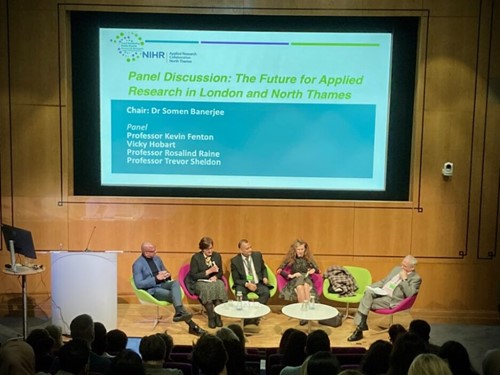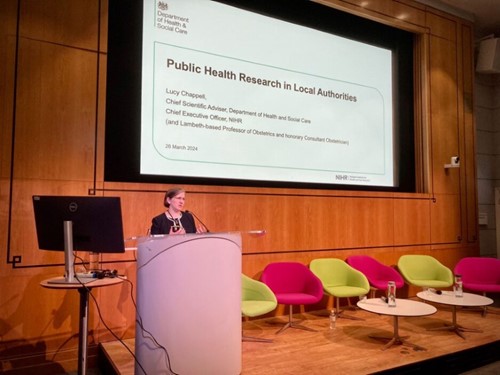
From the registration desk at LAPHRN 2024
"The pandemic really brought to the fore the need to do public health research in a different way" said Kevin Fenton CBE in his opening keynote for our inaugural Local Authority Public Health Research Network (LAPHRN) Conference on 26th March.
This is why this network was born. Established by NIHR ARC North Thames, we wanted to bring local authorities and public health researchers together to build healthier futures for people and communities.
The day was packed with insights. Still, five main themes stood out during the day that will influence our practice. If you’re working in public health – whether in academic or local authorities – we hope these inspire you.

Panel discussion on the future for Applied Research in London and North Thames
1. Create more inclusive research
Public health research really needs to be multidisciplinary and intersectoral. Part of that means ensuring as many people as possible can contribute to and shape research. That requires us to ask vital questions, like: how can an antiracist approach to research help us tackle ethnic health inequalities? how can we rebalance the power in setting public health priorities?
Inclusivity in research also means embracing a broad view of research that captures what’s needed for the here and now. We need to get beyond just public health and outside of our own sectors. This may require us to leave our organisational or disciplinary ‘hats’ at the door – dropping jargon and being open to doing things differently.
2. Harness the power of communities
We need to bring the public into public health.
Many local authorities and partners are seeking to do just that – actively working with local communities in a range of ways, from setting the priorities to training and involving them actively as community researchers.
Often this means working with the tensions. Like: how do we make sure action arises from what communities are telling us? Or: How do we define the outcomes that people and communities are looking for? Especially when these outcomes can be quite different to the outcomes ‘experts’ want to see.
3. Share research more widely
The conference provided a forum for people to share practice and ideas. In many sessions we also heard that delegates wanted to keep up to date with what was going on in research and in local authorities.
This field is changing, with developments making it easier to find out what’s going on – e.g., NIHR’s public health research page - are making this easier. But this is where networks, publications (both peer reviewed and otherwise), and connecting beyond our usual audiences are also needed.

Poster presentations at LAPHRN 2024
4. Look to the future
Having a strong vision for a healthier future for people and communities helps us get beyond silos and competition. It helps us think more radically about how research can be done differently to overcome our health inequalities.
Emerging technology can help support this vision – from machine learning to data linkage, the possibilities are as great as the public health challenges we face.
It helps to get together to step back and look ahead to where we want to go together.
5. Build networks and partnerships
Conference attendees told us they were largely motivated to come along to meet others. It was palpable to see colleagues throughout the day exchanging contact details, ideas, and tips. It’s clear the value of this to the work of public health – none of the solutions we need for better public health can be achieved alone.
That was the reason we established the network: we believe a lot can be gained from sharing insights and exchanging ideas. We look forward to the next step of turning those forming and developing networks into research collaborations.
Article by Dr Leonora Weil and Dr Jessica Sheringham, the co-chairs of the Local Authority Public Health Research Network. With thanks to the LAPHRN (London and North Thames) Conference Committee and notetakers from all of the session for their reflections.

Afternoon keynote speech from Lucy Chappel, CEO of NIHR and Chief Scientific Advisor at the Department of Health and Social Care

 22 Apr 2024
22 Apr 2024